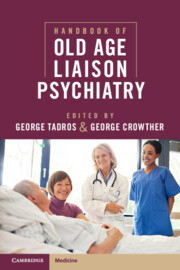Book contents
- Handbook of Old Age Liaison Psychiatry
- Handbook of Old Age Liaison Psychiatry
- Copyright page
- Contents
- Contributors
- Introduction
- Chapter 1 Psychological Well-Being in Later Life
- Chapter 2 The Epidemiology of Mental Illness in Older People in Acute Hospitals
- Chapter 3 Elderly-Friendly Care Settings and Hospitals
- Chapter 4 Communication with Older People
- Chapter 5 Privacy and Dignity in Acute Hospitals
- Chapter 6 Liaison Psychiatry and Law
- Chapter 7 Safeguarding Adults
- Chapter 8 Carers’ Needs before, during, and after Hospital Admissions
- Chapter 9 Dementia and Related Disorders
- Chapter 10 Behavioural and Psychological Symptoms of Dementia in Hospital Settings
- Chapter 11 Liaison Old Age Psychiatry Management of Delirium in Acute Hospitals
- Chapter 12 Depression and Associated Disorders
- Chapter 13 Prevention of Suicide and Self-Harm in Older People
- Chapter 14 Fear and Anxiety in Acute Settings
- Chapter 15 Late-Onset Psychosis and Related Disorders
- Chapter 16 Drug and Alcohol Misuse in Older People
- Chapter 17 Perioperative Medical Management of Older People
- Chapter 18 Parkinson’s Disease and Related Disorders in Acute Hospitals
- Chapter 19 Comprehensive Geriatric Assessment in Clinical Practice
- Chapter 20 Interface between Liaison Psychiatry Services for Older People and Wider Community Services
- Chapter 21 Psychometric Measures in Old Age Psychiatry
- Index
- References
Chapter 5 - Privacy and Dignity in Acute Hospitals
Published online by Cambridge University Press: 04 April 2024
- Handbook of Old Age Liaison Psychiatry
- Handbook of Old Age Liaison Psychiatry
- Copyright page
- Contents
- Contributors
- Introduction
- Chapter 1 Psychological Well-Being in Later Life
- Chapter 2 The Epidemiology of Mental Illness in Older People in Acute Hospitals
- Chapter 3 Elderly-Friendly Care Settings and Hospitals
- Chapter 4 Communication with Older People
- Chapter 5 Privacy and Dignity in Acute Hospitals
- Chapter 6 Liaison Psychiatry and Law
- Chapter 7 Safeguarding Adults
- Chapter 8 Carers’ Needs before, during, and after Hospital Admissions
- Chapter 9 Dementia and Related Disorders
- Chapter 10 Behavioural and Psychological Symptoms of Dementia in Hospital Settings
- Chapter 11 Liaison Old Age Psychiatry Management of Delirium in Acute Hospitals
- Chapter 12 Depression and Associated Disorders
- Chapter 13 Prevention of Suicide and Self-Harm in Older People
- Chapter 14 Fear and Anxiety in Acute Settings
- Chapter 15 Late-Onset Psychosis and Related Disorders
- Chapter 16 Drug and Alcohol Misuse in Older People
- Chapter 17 Perioperative Medical Management of Older People
- Chapter 18 Parkinson’s Disease and Related Disorders in Acute Hospitals
- Chapter 19 Comprehensive Geriatric Assessment in Clinical Practice
- Chapter 20 Interface between Liaison Psychiatry Services for Older People and Wider Community Services
- Chapter 21 Psychometric Measures in Old Age Psychiatry
- Index
- References
Summary
Numerous reports addressing the care of older people have highlighted deficiencies in th provision of nutrition, hydration, and personal hygiene. Healthcare organisations may inadvertently compromise dignity by prioritising measurable targets and not placing due emphasis on the core work of looking after frail older people who are at risk of having their dignity violated.
The concept of dignity draws on ideas of dignity of merit, moral stature, and Menschenwürde (human dignity) – the dignity that each individual has as an essential component of being a human being. It is argued here that older people, as a group, are particularly worthy of the dignity of merit of wisdom, by virtue of their experience and associated understanding.
A suitable environment is important to promoting dignity; the emphasis is not only on basics like nutrition, hydration, and hygiene but on the delivery of person-centred care that encourages understanding of an older person’s life story.
Dying will come to us all (with even greater certainty than old age), and all older people have a right to respect and dignity when dying. Understanding how someone lived their life, and what was important to that person allows us to co-write the final chapter with preservation of autonomy and maintenance of dignity of personal identity.
Keywords
- Type
- Chapter
- Information
- Handbook of Old Age Liaison Psychiatry , pp. 59 - 69Publisher: Cambridge University PressPrint publication year: 2024



